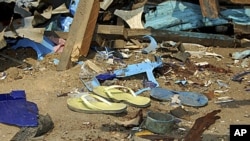Nigerian security forces say they have arrested more than 100 “dissidents” in connection with a series of bombings across northern states.
Nigerian State Security Service spokesperson Marilyn Ogar says authorities have arrested more than 100 “key cell commanders” and dissidents in the states of Bauchi, Borno, Kaduna, Kano, Yobe and Adamawa.
"For strategic, operational reasons details of those arrested will remain classified as they are still undergoing the process of deradicalization, perception management, and also we are trying to win their confidence so they can return back to society,” said Ogar.
The arrests follow bombings of beer gardens in the city of Maiduguri over the last two weeks that killed more than 30 people. No one has claimed responsibility, but the Islamic militant group Boko Haram is suspected of being behind the attacks.
Ogar says none of those arrested have yet been charged because of what she calls President Goodluck Jonathan's carrot-and-stick approach to defusing the violence.
"Being Nigerians, for whatever reasons, they have gone overboard. We have to first of all try to engage them and talk them out of those reasons,” Ogar stated.
Boko Haram has so far refused President Jonathan's offer to open talks, saying it can not negotiate while security forces are trying to destroy it.
The Islamic sect recognizes neither Nigeria's constitution nor the federal government in Abuja and says it is fighting for the creation of an independent country ruled by Islamic law.
The group launched an uprising across much of the north in 2009 that was put down by Nigeria's military in a campaign that killed more than 800 people, including Boko Haram leader Mohammed Yusuf. The group has long charged that Yusuf was killed in police custody.
Ogar says security forces are now taking a different approach with Boko Haram. "Of course we are still grappling with the issue of the killing of Mohammed Yusuf. I hope you understand me. So we can't charge any person for now. Unless, of course, if there is sufficient evidence to prove that they have refused to be deradicalized,” she explained.
Boko Haram claims responsibility for last month's bombing outside national police headquarters in Abuja. The capital is now under a limited curfew.














